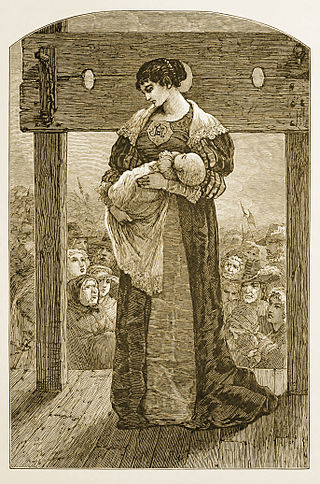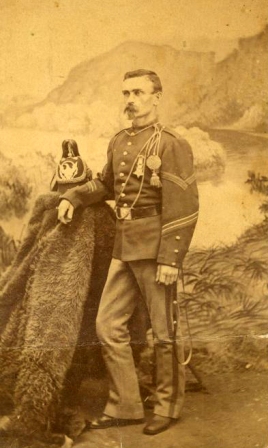Related Research Articles

Gregory of Nazianzus, also known as Gregory the Theologian or Gregory Nazianzen, was a 4th-century archbishop of Constantinople and theologian. He is widely considered the most accomplished rhetorical stylist of the patristic age. As a classically trained orator and philosopher, he infused Hellenism into the early church, establishing the paradigm of Byzantine theologians and church officials.

Hominy is a food produced from dried maize (corn) kernels that have been treated with an alkali, in a process called nixtamalization. "Lye hominy" is a type of hominy made with lye.

The Scarlet Letter: A Romance is a work of historical fiction by American author Nathaniel Hawthorne, published in 1850. Set in the Puritan Massachusetts Bay Colony during the years 1642 to 1649, the novel tells the story of Hester Prynne, who conceives a daughter with a man to whom she is not married and then struggles to create a new life of repentance and dignity. As punishment, she must wear a scarlet letter 'A'. Containing a number of religious and historic allusions, the book explores themes of legalism, sin and guilt.

Menudo, also known as Mondongo, pancita or mole de panza, is a traditional Mexican soup, made with cow's stomach (tripe) in broth with a red chili pepper base. It is the Mexican variation of the Spanish callos or menudo. Similar dishes exist throughout Latin America and Europe including mondongo, guatitas, and in Italy Trippa alla romana.

A Woman of No Importance by Oscar Wilde is "a new and original play of modern life", in four acts, first given on 19 April 1893 at the Haymarket Theatre, London. Like Wilde's other society plays, it satirises English upper-class society. It has been revived from time to time since his death in 1900, but has been widely regarded as the least successful of his four drawing room plays.

Abu ‘Abd ar-Raḥmān al-Khalīl ibn Aḥmad ibn ‘Amr ibn Tammām al-Farāhīdī al-Azdī al-Yaḥmadī, known as al-Farāhīdī, or al-Khalīl, was an Arab philologist, lexicographer and leading grammarian of Basra based on Iraq. He made the first dictionary of the Arabic language – and the oldest extant dictionary – Kitab al-'Ayn – introduced the now standard harakat system, and was instrumental in the early development of ʿArūḍ, musicology and poetic metre. His linguistic theories influenced the development of Persian, Turkish, Kurdish and Urdu prosody. The "Shining Star" of the Basran school of Arabic grammar, a polymath and scholar, he was a man of genuinely original thought.

Hester Prynne is the protagonist of Nathaniel Hawthorne's 1850 novel The Scarlet Letter. She is portrayed as a woman condemned by her Puritan neighbors for having a child out of wedlock. The character has been called "among the first and most important female protagonists in American literature".

Chicken à la King is a dish consisting of diced chicken in a cream sauce, often with sherry, mushrooms, and vegetables, generally served over rice, noodles, or bread. It is also often served in a vol-au-vent or pastry case. It is sometimes made with tuna or turkey in place of chicken.
This is a timeline of music in the United States prior to 1819.
This is a timeline of music in the United States from 1820 to 1849.

Publius Cornelius Tacitus, known simply as Tacitus, was a Roman historian and politician. Tacitus is widely regarded as one of the greatest Roman historians by modern scholars.

August Semmendinger was a manufacturer of photographic apparatuses and the inventor of the Excelsior Wet Plate Camera. Semmendinger first made his cameras in New York City. The second factory where he built his cameras was located in Fort Lee, New Jersey.

John W. Comfort was an American soldier in the U.S. Army who fought during the American Civil War and the Indian Wars from 1861 until his retirement in 1892. He was a member of the 4th U.S. Cavalry during the Texas–Indian Wars and, while battling the Kiowa and Comanche in the Staked Plains in November 1874, killed a Native American in armed combat. He was one of several soldiers cited for bravery in this battle and received the Medal of Honor the following year.

The Capture of HMS Savage was a naval battle of the American Revolutionary War involving the American privateer Congress and the British sloop-of-war HMS Savage. It occurred in September 1781 off South Carolina and is considered one of the hardest-fought single ship actions of the war.

Thirty-nine Reasons Why I Am a Vegetarian is a 1903 publication on vegetarianism by Henry Stephen Clubb, published by the Vegetarian Society of America.
Hester Davenport was a leading actress with the Duke's Company under the management of Sir William Davenant. Among the earliest English actresses, she was best known as "that faire & famous Comoedian call'd Roxalana," as diarist John Evelyn put it after seeing her on 9 January 1661/2. Her career ended when she married Aubrey de Vere, 20th Earl of Oxford (1627-1703) in 1662 or 1663. The couple had a son in 1664. Oxford soon deserted Davenport and his son Aubrey, marrying a fellow nobleman's daughter in January 1672. In a 1686 church court case, Oxford admitted the marriage ceremony with Davenport had been a sham.

Howard Radclyffe Roberts Jr. was an American entomologist known for his work on grasshoppers. His 1941 University of Pennsylvania Ph.D. dissertation was an early work highlighting the role phallic structures could play in grasshopper taxonomy. While serving in World War II, he and Edward Shearman Ross cowrote The Mosquito Atlas, used by the armed forces to identify malaria-transmitting mosquitos. Roberts worked for the Academy of Natural Sciences of Philadelphia (ANSP), serving as its managing director from 1947 to 1972. He described dozens of grasshopper species from North and South America, and also is the eponym of several taxa named in his honor.
The Scarlet Letter is an American silent drama film distributed by Fox Film Corporation and based upon the 1850 eponymous novel by Nathaniel Hawthorne, with some additional plot added taking place before the events of the novel. It was written and directed by Carl Harbaugh. An incomplete print of the film in 1 reel exists. The film used the novel's text to create subtitles, and in 1917 The Moving Picture World called it "as nearly flawless as it is humanly possible for it to be."